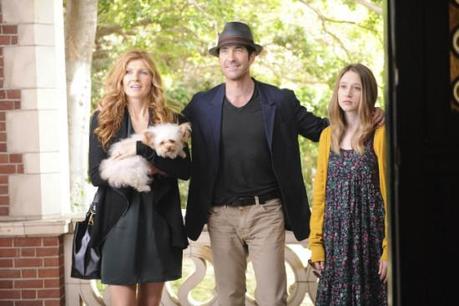Contributor: Gregg Wright
Perhaps the most mysterious new show of the fall season was “American Horror Story”, which had an unusual stream of marketing that was as cryptic as it was tantalizing. Most of the promotional materials seemed to impart very little of the show’s actual premise or story, which instead had to be gleaned from the rather simplistic plot summaries found online. All I really knew was that “American Horror Story” centered around the oft-used horror convention of a family moving into an old house where supernatural weirdness ensued. There also seemed to be a heavy sexual element to the show. I was intrigued enough by first bits of the marketing and the premise to make the choice to avoid digging any deeper.

Really, one of my biggest worries about the show was that it would simply be a bit too weird for me to enjoy. What attracts me the most to the horror genre is being able to vicariously experience terror through relatable characters, and the marketing made me wonder if “American Horror Story” would be offering something different. To my surprise, however, the pilot episode seemed to be allaying most of my fears during the early scenes. Rather than openly satiring classic horror, “American Horror Story” thoroughly embraces its genre influences. But the show approaches these tropes with enough freshness and enough sly winks at the audience to keep it from feeling derivative.
“American Horror Story” seems very aware of horror genre conventions (particularly in respect to classic horror), and seems to be consciously attempting to play with these conventions. There’s the troubled family moving into the creepy old house with a violent history. There’s the creepy children, creepy neighbors, and creepy basement (see a theme developing here?). Even the characters themselves seem to be genre-aware, to a certain extent. James Levine’s music also rather brilliantly evokes the feel of classic horror, as you’ll notice from the somber, mysterious strings and piano. Some of the weirder sounds and visuals seem reminiscent of “Psycho” or Stanley Kubrick’s “The Shining.” More than once, I wondered if some of the music tracks had been lifted straight from a Bernard Herrmann score. And for the record, I mean that as a compliment.
Unfortunately, the show does undergo something of a transformation as it progresses. There are a couple of important areas where the show begins to distance itself from previous examples of the genre, perhaps most prominently in its psycho-sexual component. In addition, the show attempts some truly unusual, dream-like stylistic flourishes (which have brought forth comparisons to David Lynch) which seem to increase in frequency and weirdness as the episode progresses. The show seems to take a perverse delight in its unconventional approach and deconstruction of the genre.
Honestly, I found the constant rapid cutting and the occasionally jittery camerawork distracting and irritating. In this area, at the very least, I really wish the show was a little more conventional. The pilot episode also feels overly rushed, and the editing seems to only worsen the feeling that everything is happening way too quickly. The show’s approach makes it difficult to tell what’s real and what’s not, which I suppose is part of the point. But it makes it extremely difficult to actually immerse one’s self in the story. There’s a strong potential for relatable characters, but the show seems so content to revel in its own manic strangeness that it’s difficult to actually experience “American Horror Story” as anything but an outside observer, cautiously witnessing a fiction unfold.
Will viewers be intrigued by “American Horror Story’s” unique take on the genre? Or is the show simply too strange to remain appealing in the long run? It’s hard to ignore the brilliance in “American Horror Story”. But I must admit, I had trouble enjoying “American Horror Story” on a basic level, thanks to its highly experimental nature. “American Horror Story” can be a bit unsettling in parts, but I suppose I would have preferred that the show focus more on providing genuine scares, relatable characters, and an engaging narrative (preferably with the subtle genre-awareness left intact), and have less of a focus on the psycho-sexual element and David Lynch-esque weirdness.
Rating: 7/10

